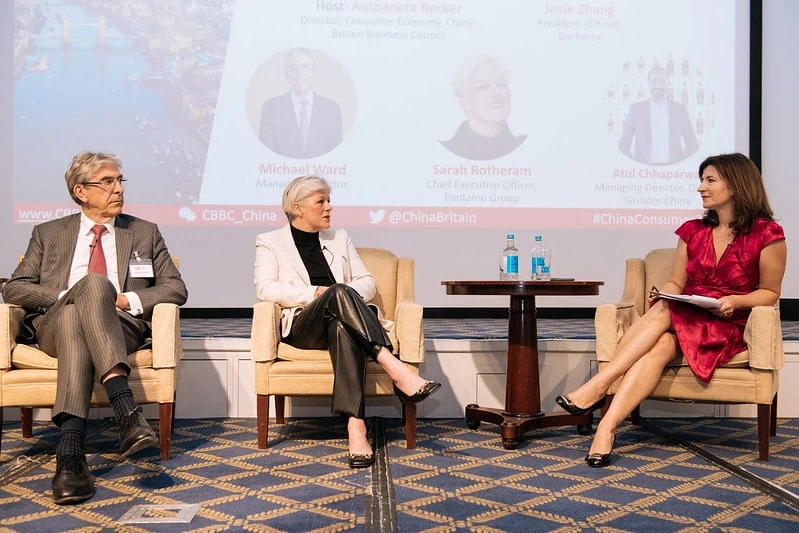Over 200 delegates attended CBBC’s flagship China Consumer 2023 Conference and Summer Reception, which took place on 4 July at London’s No.4 Hamilton Place
At the Conference, attendees heard from speakers representing leading global companies, who discussed the current trends and future opportunities within the Chinese consumer landscape for British consumer brands.
CBBC’s Chief Executive, Andrew Seaton, introduced the event, saying that it would look at opportunities and challenges in the China market.
“It has been a difficult few years with geopolitical challenges, the conflict in Ukraine and Covid restrictions, but we are now much, much closer to business as usual,” he said. “There is more travel, more flights and a return of the trade fairs and exhibitions that help business.”

“We want British companies to do business in China just like American, ASEAN and European companies do,” Seaton quoted Cleverly as saying. He went on to say that he hopes to see more UK ministers supporting business in China as now is a good moment to refocus on China.

CBBC’s chief executive Andrew Seaton offered opening remarks at the event
With UK-China trade accounting for £37 billion, China is the UK’s third-largest trading partner. Economic growth is the priority for the UK, and exports are a key driver of growth, with pharmaceuticals, healthcare, vehicles, and fashion among the key export sectors. As other export markets experience difficulty – the Eurozone is hovering around recession, and the US economy is predicting just 1.5% growth – China is essential not only to the economy but also to the 115,000-130,000 UK jobs that trade with China supports.
However, Seaton noted that China is facing challenges with youth unemployment, overcapacity in the property sector, and slowdowns in some areas of manufacturing.
“Are we looking at a post-Covid boom?” he asked. “No, but we are seeing post-Covid recovery,” he said. A predicted 5% growth in the Chinese economy this year would account for a third of all global growth, which would have a huge impact on every other nation. He reminded the audience that Guangdong Province has an economy bigger than Canada, and Jiangsu Province’s economy is bigger than Korea’s. China’s middle class is expected to double to 900 million and its high-income earners to reach 100 million, and by 2035 China is expected to be the world’s biggest economy, creating a huge demand for British goods and services.
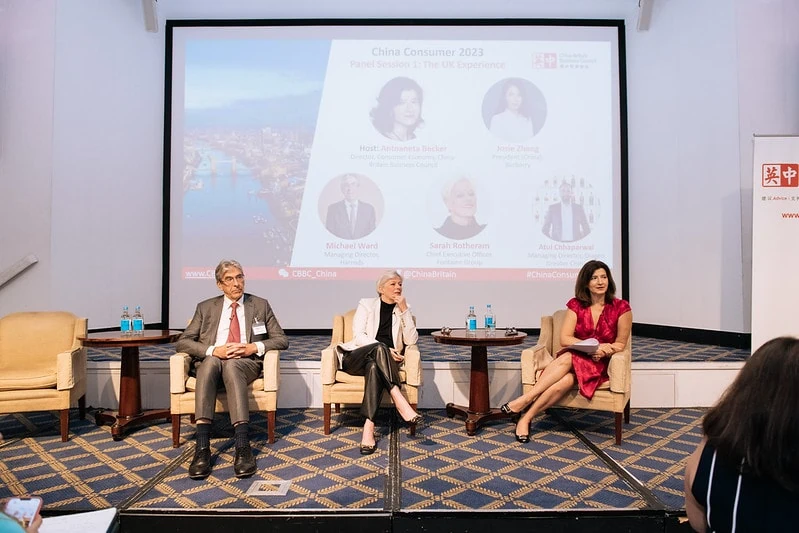
The first panel saw speakers from Burberry, Harrods, Fontraine Group and Diageo discuss the experiences of UK brands in China
UK brand experiences in the Chinese market
Antoaneta Becker, CBBC’s Director of Consumer Economy, UK, hosted the first panel of the day, which saw speakers sharing experiences of what Chinese consumers wanted and expected from British brands. “After being away from China for three and a half years, the changes I observed [during a recent visit] were more far-reaching than I expected, and the implications will affect all of us,” she said.
Becker highlighted three main changes:
- Participation: Chinese consumers demand to participate in and co-curate consumer experiences. They are demanding new ways of personal self-expression that set them apart from the crowd.
- Localisation: China Chic is sweeping through China, and “in China, for China” is now a prerequisite for brands to succeed in the Chinese market. An appreciation of Chinese heritage and culture is essential to allow Chinese consumers to relate to the brand.
- Sophistication: Consumers have had time to understand and learn about brands and are now much more sophisticated, with many subcommunities becoming very specific and sophisticated about their requirements from brands.
Atul Chhaparwal, Managing Director of Diageo for Greater China, explained that although the vast majority of drinkers in China prefer the local spirit baijiu, Diageo has seen double-digit growth for Scotch in the last 12 months, making China one of its largest markets. This growth, he explained, was because Diageo has a large portfolio of brands, which allows them to cater to different groups and price brackets. The company also has a strong localisation policy and continually innovates products to appeal to Chinese consumers whilst respecting local culture – such as producing a Forbidden City Limited edition of the famous Johnny Walker Blue Label whisky and creating designs for Chinese festivals, including Lunar New Year.
Sarah Rotherham, CEO of Fontaine Group (which owns the fragrance brand Creed), explained that the first Creed store in China opened in the midst of the pandemic in November 2021. The brand now has 18 stores and aims to make China its third biggest market within three years.
Creed started in 1760, and “that heritage gives people a reason to believe and trust in us,” Rotherham said. However, with the core China consumers aged between 18 and 25, the brand needs to remain relevant and part of the conversation, she said. To do this, they have built a strong local team. “You can’t sit in London and try to understand how to show up in China,” she says. “You need local talent to tell you what’s relevant, what will resonate, and what’s the right tone of voice.”
Creed has also worked on a number of collaborations that showcase the brand’s values, including a collaboration with Chinese rap artist Benzo, embedding the fragrance into one of his songs, and with Chinese art toy ROBBi, in which limited-edition collectables were scented using Creed fragrances and sold along with non-fungible tokens (NFTs).
Creed has also worked with Chinese artists and virtual influencer Ayayi in the metaverse to ensure it remains relevant to its youthful audience. “The innovation that comes out of China enables a China-fronted campaign to be rolled out globally,” Rotherham explains. Creed’s award-winning metaverse campaign garnered a huge amount of global attention and reached an audience of millions within days. It’s important to learn “how to engage and be part of their world without advertising to them,” Rotherham said.
Managing Director of Harrods, Michael Ward, noted that the level of sophistication of Chinese consumers has developed enormously. He said that Britain’s ‘great gift’ is its soft power: “An episode of The Crown or Downton Abbey has more impact than any tradeshow because it represents what is great about Britain.”
Following up on some of Becker’s earlier points, Ward said that “It’s no longer sufficient to simply go and sell products [to China]; you have to give back and show partnership, and it is part of our DNA to do that.”
“Harrods support initiatives where we invest in brands such as Shanghai Fashion Week,” Ward said, educating and building long-term relationships and giving something back. “We have to work with the youth of today to show them the path of tomorrow,” he said. “The fashion schools in Europe are full of Chinese students who want to learn and bring their skills back to China – and we are here to support them.”
British fashion retailer Burberry has 30 years of experience in China, says Josie Zhang, President of Burberry China. During that time, the Burberry team has seen that Chinese consumers are extremely passionate about fashion, socially savvy and eco-conscious. Zhang described how Burberry opened a social retail store in Shenzhen with Tencent that has created a digitally immersive shopping experience, merging online and offline and bringing together the customer journey. This demand for a seamless online-offline experience is only growing and was touched on a number of times throughout the day.
Like other successful British brands, Burberry has also focused on localising its offering by creating special capsule collections and activations for festivals like Chinese Valentine’s Day and Lunar New Year, including launching an avatar with Douyin, called Zaizai, who is dressed in Burberry. This is very appealing to young, tech-savvy consumers, says Zhang.
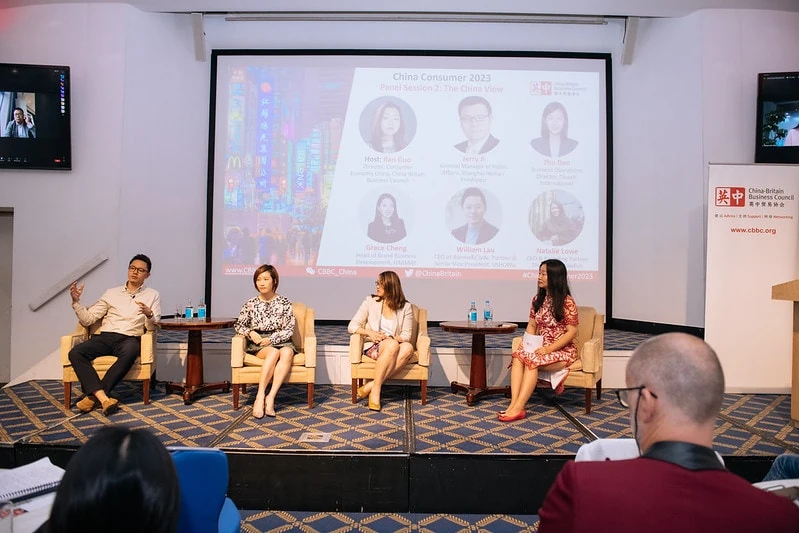
The second panel saw Hema, Douyin, Harmay, Ushopal and The Orangeblowfish discuss how they incorporate British brands and products in China’s integrated retail and e-commerce space
What can British brands learn from successful Chinese brands?
After hearing about the UK experience, the focus turned to Chinese brands for a panel that explored how the Chinese retail experience and how the evolution from offline to online has created ‘phygital’ spaces – where brands are no longer either bricks and mortar or online; they are both at the same time.
Ran Guo, CBBC’s Director of Consumer Economy, China, explained that China’s e-commerce market is almost the same size as the entire British economy and is only growing. However, offline retail still accounts for 72% of sales, with e-commerce at 20%, live streaming at 7% and cross-border retail at just 1%.
Although Alibaba, which owns Tmall and Taobao, accounts for 51% of e-commerce sales and JD.com makes up a further 20%, that shift is changing as live streaming sales pick up stream, led largely by Douyin. Clothing and daily necessities make up the majority of products sold on e-commerce platforms, while cross-border sales are made up mostly of cosmetics and food supplements, which are subject to stricter regulations in China.
Natalie Lowe, CEO and Founding Partner of The Orangeblowfish, said that the pandemic increased domestic luxury consumption in China, as shoppers restricted from travelling internationally looked to spend more at home. China currently accounts for a third of all global luxury consumers, and by 2030, 60% of all global luxury spending will come from China.
“Luxury brands are trying to make their products more accessible and integrated into their lives,” explained Lowe, using the example of Prada, which opened a store in a local fruit and vegetable market. This not only attracted a new audience but also went viral in the first 5-10 hours of the campaign. Louis Vuitton opened a restaurant in a century-old heritage building in Chengdu, which has enabled it to integrate into the local community, while outdoor equipment brand Arc’teryx designed a pop-up store that sees sunlight filtering through metal trees to create an immersive experience for customers. “Consumers don’t want transactions, they want engagement,” Lowe said.
William Lau, CEO of Chinese cosmetics company Bonnie & Clyde, described the journey of their average customer: first, they go to the shop and find a product, then they read reviews of said product on Xiaohongshu, and then they check prices on Taobao, where they will probably buy it.
This, Lau said, isn’t a problem as his parent company, Ushopal, covers all elements of the digital purchasing experience, and nothing is lost to third parties. “The shop is a touch point where customers can see and experience the brand, not just a place that has shelves of product,” he says. Previously with offline sales, it was essential that sales were converted in-store, but today, he argued, stores are about experiencing the product and building a relationship between customer and product.
Grace Cheng, Head of Brand Business Development for multi-brand beauty product store Harmay, said that Harmay is a disruptor and different from traditional retailers as with more than 400 brands and 10,000 SKUs, they focus on variety and efficiency. Harmay houses its stores in heritage buildings, integrating new brands with traditional culture and doesn’t differentiate between domestic and foreign brands. “We only care about quality and whether it will bring enough to consumers,” she said. Harmay focuses on physical stores because “offline allows consumers to experience new products.” Nevertheless, when they shop in these offline stores, customers are rapidly converted onto the company’s CRM programmes, which include over 2,000 private WeChat communities and sales delivered by Meituan to ensure products are with customers within 30 minutes.
Jerry Ji, General Manager of Public Affairs for Shanghai at Hema, said that 30% of their business is online. “So why do we spend so much on offline? Because this is where consumers can come to experience the products. It is a place for Chinese consumers to see, touch and taste products; they might buy one item and then order online for further sales,” he explained.
Live streaming platform Douyin, which launched in 2016 and now has over 600 million daily users, is disrupting China’s e-commerce landscape, becoming the main e-commerce platform where entertainment meets commerce. “Douyin has made it easier and more fun to shop and connect with people and create content,” said Zhu Dan, Business Operations Director, Douyin International. “We have disrupted the consumer journey. The consumer’s decision-making process is very fast. From content to checkout – it happens in a snap.” With an incredible 80% year-on-year growth for e-commerce, it is clear to see that this strategy is working for Douyin.
Zhu Dan said that it is important that brands have a clear position and a clear target audience to succeed on Douyin. Of course, the quality of content and the use of key opinion leaders (KOLs) are also valuable. She references a video by an Australian hair care brand that resulted in three million product sales and said that brands, including Dermalogica, are increasingly becoming more sophisticated at in-house live streaming that has clear targeting and a defined audience.

The China Consumer 2023 audience enjoyed insights from a wide range of speakers
Into the Chinaverse
As a leader in global technology, China is creating groundbreaking methods to reach consumers through both online and offline means. The third session of the event discussed the “Chinaverse”, which was defined by the panel speakers as a space for innovation in retail and consumer engagement which includes Web 3 iterations but also phygital (retail) and brand collaborations. The speakers also discussed how the Metaverse in China differs from iterations being applied in the rest of the world.
Rachel Daydou, a Partner at EY Fabernovel, recently published an in-depth report on the Chinaverse. She said that it is technically very different from the rest of the world, with big companies such as Baidu, Alibaba and Tencent creating their own systems that are not intra-operable between China and the West. There will be a race between the Chinaverse and the Metaverse to see who comes out on top, she said.
Many of the key pillars that the Metaverse is based on are not applicable in China. Crypto mining and trading are banned, there is no secondary market for NFTs meaning they can be bought but not sold, and legislators have heavily restricted gaming. However, there is a huge appetite for newness and digital products in China, Daydou said.
According to Daydou, before long, we will all interact with the metaverse in one form or another. “Lots of consumers already use Taobao Augmented Reality to decide what to buy,” she pointed out. “The integration of AR with live streaming is what we will see more in the future, and video games are the first space where we will likely see immersive tech being used on the blockchain.” She used the example of Tencent, which purchased 40% of the gaming company Epic Games – not for their games, she said, but for their gaming engine.
“It will take another 10 years for a fully functional metaverse to exist. It is the new iteration of the internet – we are talking about user-generated content, immersive experiences, and decentralised systems.” However, “the metaverse will be a new layer on top of the internet rather than replacing it.”
Many British companies have been experimenting with the Metaverse in China. Ada Yang, Senior Market Manager for Molton Brown, described how Molton Brown has created a virtual store with a personality test that helps consumers select a suitable fragrance and then creates a unique digital collection for them. The store has been launched on Tmall on the blockchain and uses an augmented reality digital collection.
Simon Mitchell, Co-Founder of the architecture firm Sybarite, is pleased that physical stores still exist and are coming back into fashion – albeit with an interactive twist. Sybarite has been working with Chinese department store SKP for a number of years after winning an international design competition – not with a physical design but with a total rebranding exercise aimed at creating an experiential shopping experience aimed at a younger, more sophisticated consumer. “In Beijing’s SKP, 65% of the space is experiential, not product focused. We used 3D designs created by graduates of Beijing art and design schools,” Mitchell said.
Each of Sybarite’s SKP projects creates different episodes and stories. “In Beijing, it was about life on Mars; in Xian, it was returning to post-apocalyptic earth; and in Chengdu, it’s about parallel worlds where gravity behaves differently,” he explained. These wild and adventurous concepts appeal to consumers who want to be taken somewhere where the metaverse and the physical world meet.
Gary Chan is Vice President of CAA Brand Management, specialising in brand collaboration – specifically, intellectual property collaborations. He showed examples of how Paddington Bear and Peter Rabbit have been used to sell everything from clothing to tea. But finding local concepts and adapting to them is key. “Easter doesn’t exist in China, which is what rabbits are most associated with in the West, but the mid-autumn moon festival is associated with Rabbits in China, so we focused on that instead to resonate with the Chinese audiences,” he said.
Chan said that it is essential that companies have a long-term plan for growth, as current market entry routes, like using virtual (or human) KOLs, can be expensive and not always cost-efficient. Sometimes partnering with an existing IP will help you leverage your brand and take part in the conversation in China, he argued.

One of the afternoon breakout sessions focused on Chinese tourists and the promise of Hainan
Why Hainan should be on the radar for British companies in 2023
Zero Covid is over, and Chinese travel has rebounded. This was one of the key messages in the Hainan breakout session hosted by CBBC’s Director, Consumer Economy China, Ran Guo, which addressed the return of Chinese tourists and the promise of domestic consumption.
Susan Huang Zhong, Head of Global Shopping Partnership, EMEA, Trip.com Group, gave an overview of the current state of Chinese tourism, explaining that at present, most Chinese tourists are travelling to countries in the Asia Pacific, including Thailand, Vietnam, Japan, and Singapore. Going to Europe is still popular, but Chinese tourists are choosing closer destinations due to the waiting times on visas.
Although people are keen to travel abroad, the southern Chinese island of Hainan is also gaining popularity due to its sandy beaches and tropical weather. When China’s borders were still closed, the island became the number one domestic destination as options further afield were unavailable. With plans for the island to become duty-free in 2025 and with a reduced tax level from 20% to 15%, the island is also becoming a destination for retailers looking to take advantage of tax breaks and the well-heeled tourist trade.
Liya Zhang, Vice President Marketing, Pernod Ricard, Global Travel Retail, said that regardless of product, the key is still building your brand. Travel retail is not just a commercial opportunity but a platform for building your brand.
Jason Cao, Vice President of Hainan Holdings (GDF) and Founder of DutyFreeExpert, explained that further offshore development is in the pipeline, but to successfully enter the Hainan market specifically, it is crucial to have product differentiation with exclusive or limited-edition products to entice customers, i.e., as discount prices won’t be enough to beat the growing competition from other brands. He also pointed out that creating a price war would be in no one’s interest, so thinking creatively, focusing on omni-channels and using technology are critical strategies.
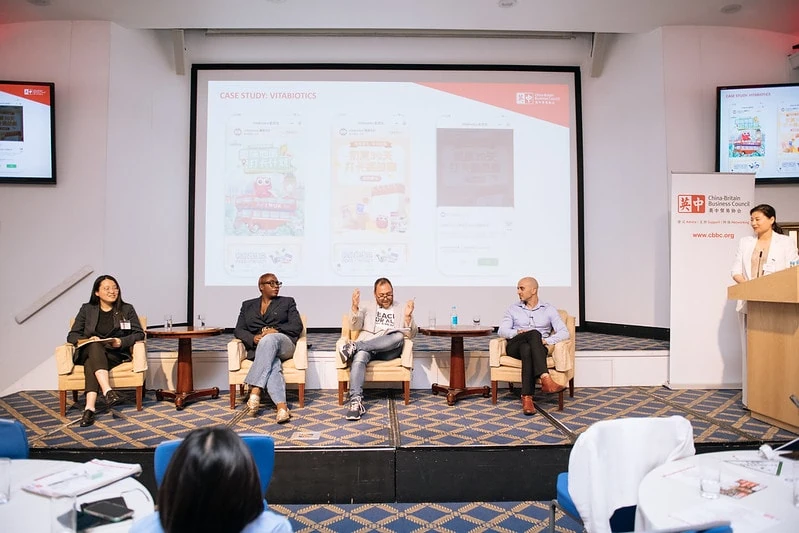
Another breakout session looked at the various e-commerce and social media platforms available in China, a key consideration for many brands
How to choose the right e-commerce platform for your brand in China
During the event’s Private Domains and Beyond session, the complexity of what is private and what is public within China’s complex digital ecosystem was explained. Social media is a public domain, whereas WeChat (or WhatsApp) groups are private domains.
Shlomi Mahfouda, Co-Founder & CEO of Up2China, explained that in the UK, consumers buy from brands’ websites, but in China, that simply doesn’t happen. Brands do have the opportunity to sell directly to consumers, but it is all done via one of the country’s many e-commerce platforms. He emphasised that different companies should use different e-commerce sales channels depending on their audience and their development in the China market.
For example, Tmall can be a fast-track to the market as it offers cross-border trading, allowing brands to bypass the often-complex regulations of distributing domestically. JD.com is about high logistics efficiency and high-quality products, whereas Pinduoduo focuses more on group purchasing. Kuaishuo focuses on third and fourth-tier cities with lower consumption levels, whilst Douyin is rapidly becoming the leader in live streaming sales.
Mahfouda said that it is important to have a strategy that will allow you to grow sales and scale your business. For example, live streaming is a booster for sales, so it can be a good entry point. “It might not be the best in terms of high consumer loyalty, but it’s a good booster,” he said. “Next, use key opinion consumers (KOCs) and KOLs to support credibility for your brand, build brand equity and get regular loyal consumers. You can take them to the private domain when you have a solid group of consumers who you can talk to directly.”
Benji Lamb, Director of China and South Asia for Vitabiotics, said that he uses KOLs to reach new audiences and KOCs to help the brand sell in private chats. “WeChat groups in China can be very effective if key opinion communities are pushing products through and mobilising with great content and brand support,” he explained. Private referral is human to human, and if people are following a KOC and trust them, they are much more likely to buy a product based on that referral.
“Livestreamers are influencers who can sell through to their followers… In the UK, people search for products they want to buy, but in China, they follow live streamers and make impulsive purchases based on their recommendations rather than via keyword search,” he noted.
Lamb also said that different demographics can be targeted on live streams depending on which KOL or KOC partners are used, but that Vitabiotics increasingly uses an in-house live streaming team to build direct relationships with customers.
Many young people in China watch live streams to feel less lonely, and it is how they spend a lot of their free time, said Robin Liu, Co-Founder of Influencer Hub International. The segmentation breakdown between KOLs to KOCs to key opinion sellers (KOSs) is important depending on what stage of market entry you are in. Some KOLs might have a huge following, but if your products are not targeted correctly, there might be a tiny conversion rate, and the costs can be vast. On the other hand, a suitable KOC might have just 2,000 followers, but if they have a 99% conversion rate, this is much better value.
Ntola Obazee, Trading Director at the ceramics company Emma Bridgewater, explained that the only way to establish trust and loyalty is via social media and streaming platforms. “It allows customers to get closer to the brand,” she emphasised. Live streaming in China now accounts for 10% of Emma Bridgewater’s sales, with live streamers often creating videos of the unboxing experience and doing live reviews of products.
“If you don’t have huge amounts of capital to invest, then working with KOLs can have an influence on the brand. 45% of our sales take place during the gifting period between November and January, and live streamers, who might not be the best for brand growth, can certainly help with direct sales.”
Obazee also uses Emma Bridgewater’s social communities and private domains to get product feedback and work out what is important to consumers. She also emphasised that customer service is crucial, as negative feedback in a private WeChat group could lead to big problems for a brand.
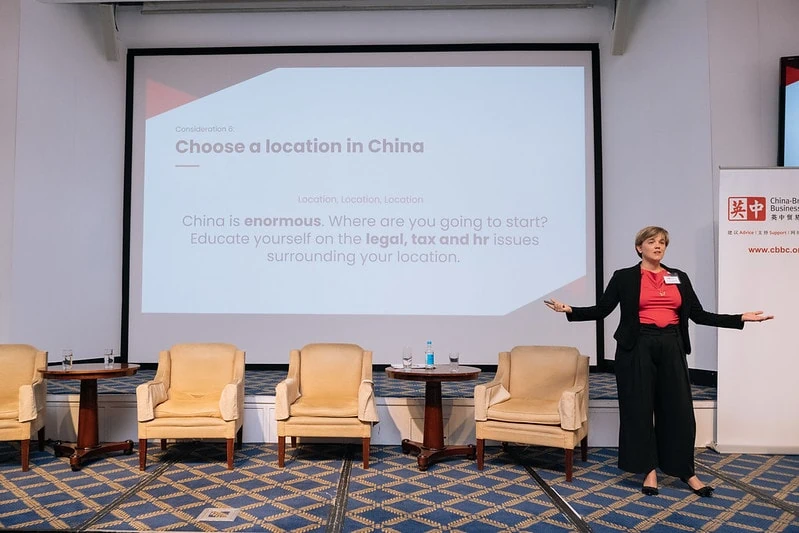
Woodburn’s Kristina Koehler-Coluccia gave a presentation on how to launch your China business and avoid the most common mistakes
Business leaders on what brands need to know about China
The afternoon was rounded out by a session with Kristina Koehler-Coluccia, Head of Business Advisory, Woodburn Accountants and Advisors, on how to launch your China business and avoid the most common mistakes, as well as a leadership conversation hosted by CBBC’s Chief Executive, Andrew Seaton.
During the session on how to launch your China business, Koehler-Coluccia sat down with Nick Parker, International Development Director, Holland & Barrett International, to discuss what brands need to do to prepare to launch their China business and avoid the most common roadblocks along the way. Parker shared Holland & Barrett’s experience in the market and valuable key learnings and takeaways from their China journey.
During the leadership conversation, Joy Isaacs, Founder and CEO of ARgENTUM, told the incredible story of her entry into the Chinese market after the daughter of superstar Wang Fei posted pictures of her beauty products online. She received a call from a Chinese distributor who wanted to help sell her products in China in 2015, and since then, she has gone from strength to strength, growing 300% in China last year.
Isaacs experienced early teething issues as the many distributors she had chosen to partner with started to undercut each other, and product prices kept falling, so they stripped it back and found a partner who could control the brand, price, and image.
“Working in China is much more creative than I ever thought,” Isaacs said. “It is fascinating what the KOLs can do around archetypes and other ideas that I would love to bring back to the UK. Customers in China want to know a lot more about the products, so we need to go into story-telling mode and show even the raw materials and how the products are made. In the UK, it’s ‘less is more’; in China, they want the detail,” she said.
William Butler-Adams OBE CEng, Chief Executive Officer, Brompton Bicycle, described a China journey that started 20 years ago with a Shanghai shop that flopped but now sees the company flying high.
“The world is facing some big global problems, and those problems will be solved by business,” he said. “We are trying to solve urban transport issues, so we need to get people on bikes in cities in China and engage with communities like we do elsewhere in the world.”
Butler-Adams says that the 20-35-year-old generation cares about the quality of a product and its social and environmental impact. They don’t want cheap products that have a negative impact on the environment or fakes that are potentially dangerous.
“The retail expectation in China is higher than anywhere else in the world. It allows you to go wild and do things differently. What we are doing with our Shenzhen store is bonkers. If we did that in Berlin, it would freak them out,” he said, explaining that China is a great place to try things first that can then be rolled out around the rest of the world.
He said that his advice for people entering the China market would be first to go out there and see the country. Even from a 10-day trip, it will be clear if there is an opportunity or not.
“The retail expectation in China is higher than anywhere else in the world. It allows you to go wild and do things differently. What we are doing with our Shenzhen store is bonkers. If we did that in Berlin, it would freak them out”

China’s ambassador to the UK Zheng Zeguang addressed the CBBC Summer Reception, which rounded out China Consumer 2023
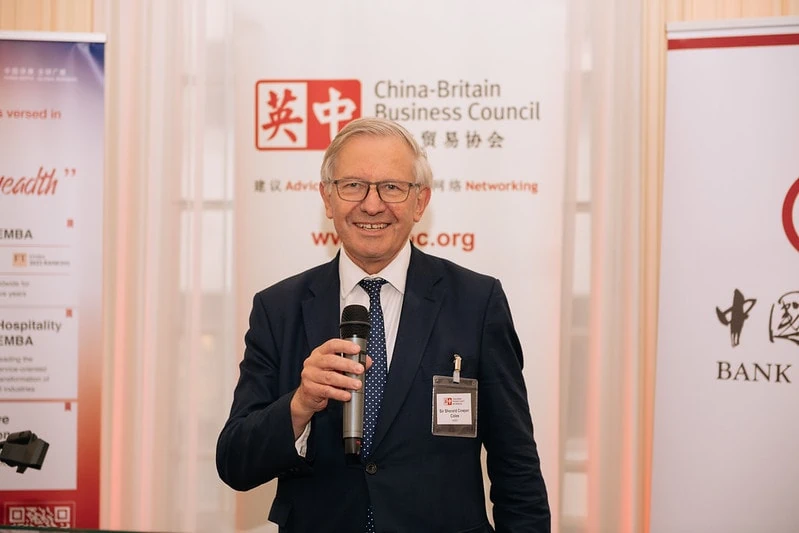
CBBC Chair Sir Sherard Cowper-Coles addressed the CBBC Summer Reception, which rounded out China Consumer 2023
The day was concluded by CBBC’s Summer Reception, which was attended by the Chinese Ambassador to the UK, Zheng Zeguang, who, alongside CBBC Chair Sir Sherard Cowper-Coles, addressed delegates, speakers and CBBC members.
The Summer Reception brought together the UK-China business community to mark a turning point, with the end of Covid travel restrictions, the focus on economic growth in China, and the improved UK-China political context adding up to a significantly more positive environment for UK-China business after the challenges we have seen over the past two years.
The event proved an enjoyable occasion to catch up with old friends and network with new contacts whilst celebrating the achievements of CBBC and our members.
CBBC would like to thank our sponsors for their support in delivering China Consumer 2023 and the Summer Reception: Woodburn Accountants & Advisors; Diageo; HSBC; Bank of China; China Europe International Business School; and The Orangeblowfish. We would also like to thank our Supporting Partners: Food & Drink Exporters Association; Manchester China Forum; Scottish Development International; UK Government; and Walpole.
For further enquiries about China Consumer 2023, please email Antoaneta.Becker@cbbc.org
To enquire about membership at CBBC, please email membership@cbbc.org or visit www.cbbc.org/membership


